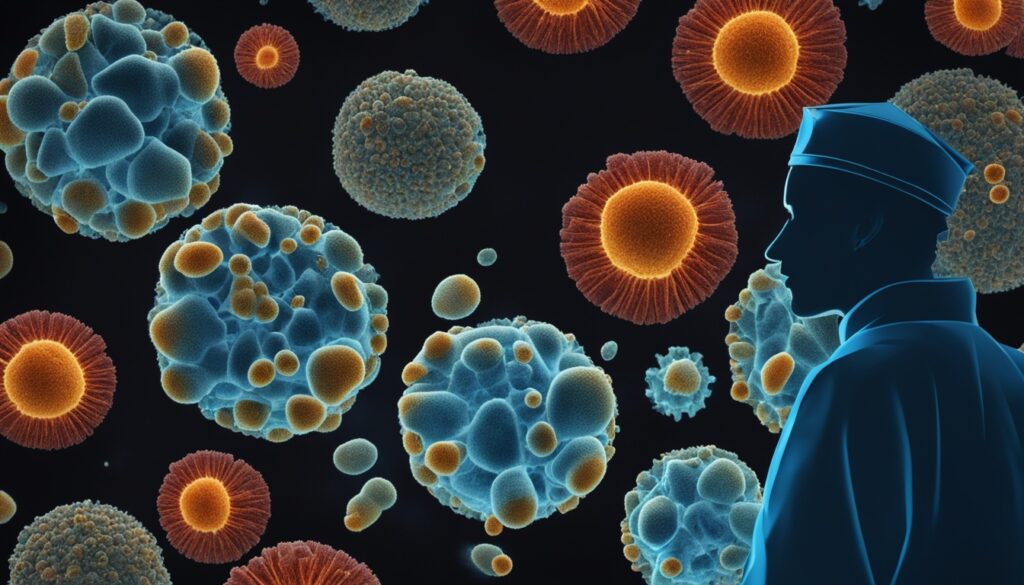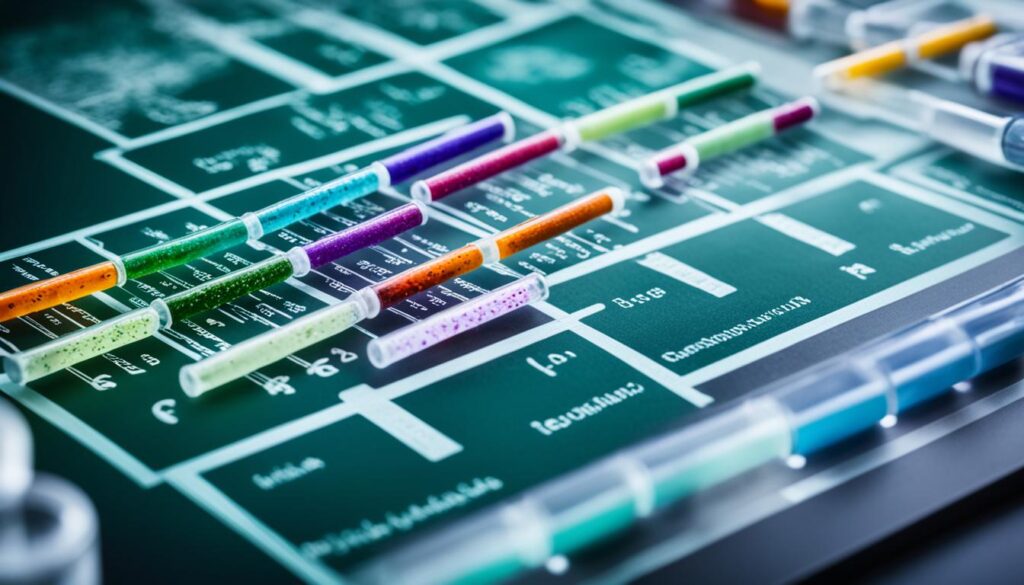Are you thinking about getting a PhD in Microbiology in India? It’s an exciting path. This degree dives deep into the world of tiny organisms and how they interact with us and our world. It’s a chance to gain top-level knowledge in a field full of discoveries.
India has many top universities offering PhD programmes in Microbiology. You can choose from places like Bhavan’s College in Mumbai or the College of Basic Sciences and Humanities at Orissa University of Agriculture and Technology. Each place offers something special, from a wide range of courses to big research chances.
Key Takeaways
- Comprehensive PhD programmes in Microbiology offered by top universities in India
- Diverse course curricula covering topics like immunology, molecular biology, and genetics
- Affordable tuition fees starting from ₹70,000 per year for the 3-year PhD programme
- Eligibility requirements typically include a Master’s degree with 55-60% marks
- Excellent career prospects, with placements offering up to ₹55 LPA
Understanding PhD in Microbiology
Course Overview
The PhD in Microbiology is a top-level degree that looks into the world of tiny living things and how they work with our bodies. It gives you deep knowledge in microbiology. This helps you make big impacts in a changing field.
You’ll study many topics, like how tiny organisms work, their effects on the environment, and their role in keeping our immune system healthy. You’ll also learn about molecular biology, immunology, and biochemistry. This gives you a full view of the subject.
This programme gives you the skills and knowledge to solve complex problems. It prepares you for jobs in academics, the medical industry, or public sectors. You’ll be able to make important discoveries and help others.
Studying for a PhD in Microbiology in India usually takes 3 to 5 years. You’ll do a lot of lab research and coursework. This builds on what you learned in your master’s degree. You’ll become a leading expert in microbiology.

Eligibility Criteria and Admission Process
To apply for a PhD in Microbiology at top Indian universities, you must meet certain criteria. These include:
- A master’s degree in Microbiology or a related field with at least 55% marks.
- If you have an MPhil degree, you can also apply with a minimum of 50% marks.
- There is no age limit for starting a PhD in Microbiology.
- You must show strong analytical skills, research ability, and good English skills.
- Being able to work well in a team and solve problems is also important.
Top Entrance Exams
To get into a PhD in Microbiology, you need to pass a national or state-level entrance exam. Some top exams are:
- UGC NET (University Grants Commission National Eligibility Test)
- CSIR-UGC NET (Council of Scientific and Industrial Research-UGC National Eligibility Test)
- College or university-specific entrance tests
These exams have 80-100 questions. They cover Verbal Ability, Quantitative Aptitude, Data Interpretation, and Logical Reasoning. The test can last up to 4 hours. If you pass, you’ll be asked to an interview to show your research skills and knowledge.
Also Read: PhD Without UGC NET

The admission is very competitive, with only a few spots available. It’s important to prepare well and work on your skills. This will help you stand a better chance of getting into a PhD program in Microbiology.
PhD in Microbiology in India
India has many top institutes for a PhD in Microbiology. They offer great chances for those wanting to study further in this exciting field. Sankara Nethralaya in Chennai, IGIMS in Patna, and TNMC in Mumbai are some of the best places for this.
These places are known for their strong research and new ideas. They draw students from all over the country and even the world. The PhD course covers many parts of Microbiology. This includes research methodology, research and publication ethics, industrial and pharmaceutical microbiology, immunotechnology and biotechnology, virology, and medical microbiology.
The Department of Microbiology at these institutes works with research centres and universities worldwide. This includes Ireland, Mexico, the United Kingdom, and Taiwan. Students get to join in on projects and research with others from different countries. This makes their studies and research better.
| Institute Highlights Sankara Nethralaya, Chennai |
|
| Vels University Chennai |
|
| IGIMS, Patna |
|
| TNMC, Mumbai |
|
The PhD in Microbiology in India shows the country’s dedication to science and innovation. These top institutes keep bringing out skilled researchers and experts. They are making big impacts in Microbiology, both in India and around the world.
Course Curriculum and Fees
A PhD in Microbiology in India covers the exciting world of tiny organisms and their many uses. It lasts at least 3 years. Students learn through research, experiments, and theory.
Syllabus Highlights
The PhD in Microbiology syllabus gives a full education. It includes topics like:
- Research Methodology
- Research and Publication Ethics
- Industrial and Pharmaceutical Microbiology
- Immunotechnology and Biotechnology
- Virology
- Medical Microbiology
This makes you understand the field better. It also gives you skills and knowledge for the industry or advanced research.
| University | Number of Students |
|---|---|
| Lovely Professional University | 5484 |
| Chandigarh University | 3130 |
| Delhi University | 1735 |
| SRM Institute of Science and Technology | 1633 |
| Kalinga Institute of Industrial Technology | 1558 |
The cost for a PhD in Microbiology in India is between Rs. 95,000 and Rs. 1.66 Lakhs a year. It depends on the school and scholarships. Many schools offer scholarships and aid to help students.
Career Prospects and Top Recruiters
Getting a PhD in Microbiology opens many doors for graduates. You can work in academia, the medical industry, and the public sector. You’ll know a lot about pharmaceuticals, food industries, and healthcare companies. This knowledge helps you in roles like pharmacologists, food technologists, and microbiologists.
The average salary for Agricultural and Food Scientists in India is about INR 9 LPA. Biochemists and Biophysicists get around INR 12 LPA. Biological Technicians earn an average of INR 10 LPA. And Chemical Technicians in the government can make up to INR 11 LPA.
| Job Role | Average Salary (LPA) |
|---|---|
| Pharmacologist | INR 6.5 |
| Food Technologist | INR 5.9 |
| Medical Lab Technologist | INR 5.5 |
| Medical Microbiologist (Government) | INR 7.8 |
| Research Associate (Private) | INR5.5 |
Top recruiters for microbiologists in India are big names like Britannia, Bisleri, Johnson & Johnson, Sun Pharma, Apollo, and Emcure Pharmaceuticals. These companies offer a variety of jobs and good pay. A PhD in Microbiology sets you up for a rewarding and well-paid career.
Also Read: Easy way to do PhD in India
Conclusion
A PhD in Microbiology is a rewarding path with many career options. It prepares you for jobs in academia, the medical field, or the public sector. You’ll gain deep knowledge and skills in research.
With this degree, you can work as a pharmacologist, food technologist, or microbiologist. You could be in pharmaceutical companies, food industries, or healthcare. Microbiology’s broad applications mean your skills are needed in many areas. This lets you make a big impact in your field.
Top universities in India offer a detailed curriculum and help with job placement. This makes your PhD journey valuable. Use this chance to grow, advance microbiology, and build a career that matches your interests and goals.
Contact us for more details about the universities offering flexible and affordable PhD Programs in Microbiology in India


